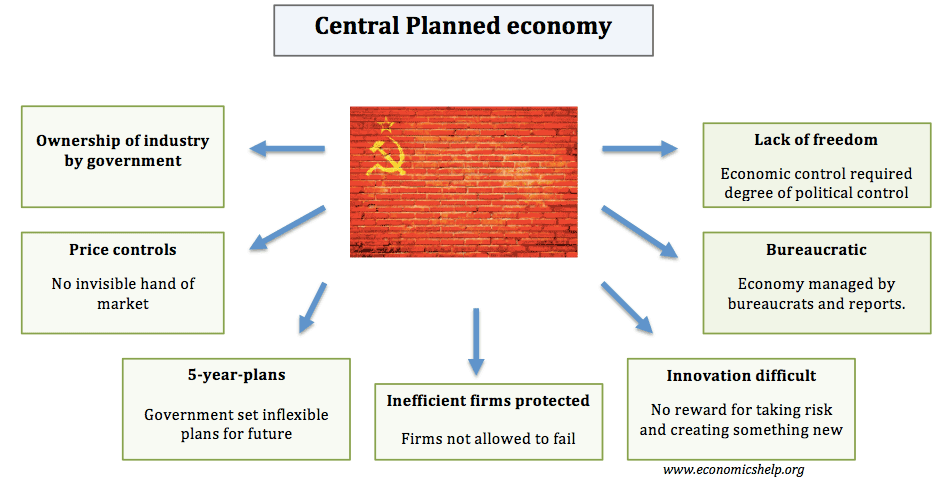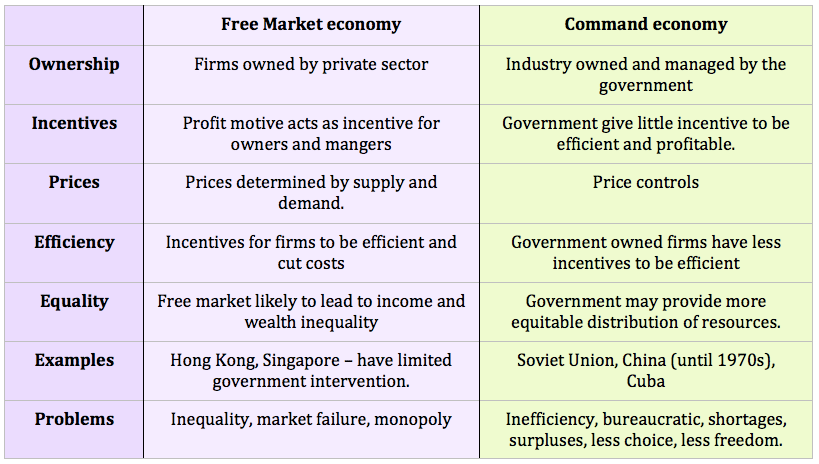Definition – A centrally planned economy is an economy where decisions on what to produce, how to produce and for whom are taken by the government in a centrally managed bureaucracy.
Central planning is also referred to as a ‘Command economy’ or ‘Communist economy.’
WIth Central planning, the theory is that the government will take ownership of the means of production and run the economy in the interest of workers. The theoretical basis of a planned economy stems from the work of Karl Marx
“To my mind, the so-called ‘socialist society’ is not anything immutable… It’s crucial difference from the present order consists naturally in production organized on the basis of common ownership by the nation of all means of production.”
- Karl Marx (Letter to Otto Von Boenigk (1890)
In theory, a Centrally planned economy can overcome market failure and achieve equality of distribution. Supporters of centrally planned economy argue that when economic decisions are left to the free market – monopolies emerge to exploit consumers. Furthermore, the Capitalists (those who own private property) can earn money through exploiting the labour of others. A centrally planned economy allows a fair distribution to all and not just the capitalist class.
The Soviet Union often announced ‘5-year plans’ where targets for steel production would be created. In the period 1928-40 and after the Second World War, these Five-year plans were very successful in terms of expanding the Soviet Union’s industrial production. The Soviet Union achieved very rapid rates of economic growth. However, by the 1960s, the system was struggling with corruption, inefficiency and a lack of incentives.
The rapid economic growth of the Stalin years also occurred against a backdrop of political repression.
Examples of Central Planning
- The Soviet Union 1917-1991 and Soviet Bloc
- China until the late 70s
- Cuba
Features of a Centrally planned economy
- Ownership by government
- Decisions on what to produce, how to produce and how to distribute goods taken at national bureaucratic level
- Prices usually set by price controls rather than market forces.
- Distribution according to ration books.
- Production could be planned for five or ten years in advance
- Requires more levels of bureaucracy to manage and plan economic decisions
- Scope for inefficiency due to lack of incentive
- Scope for corruption due to power of bureaucrats
- Often required degree of political control and censorship.
Problems of Central Planning Economies
- Governments are poor at predicting future trends.
- Lack of incentives when income is guaranteed.
- Inflexible. Difficult to respond to shortages and surpluses
- Greater scope for corruption
- Planned economies often associated with greater political repression
- People achieve targets for the sake of it, rather than what is needed. There was a joke in the Soviet Union made by workers “They pretend to pay us, and we pretend to work.” The goal was often to achieve targets, rather than really meet needs, therefore as much effort went into massaging figures and reports and producing socially useful goods.
Centrally planned economy vs Free market economy
Related



Hello, I was searching more about Planned Economy and ended up here, reading everything you’ve posted in this page, however, I’m afraid that the Invisible Hand of Adam Smith is also a big failure and I fundament my argument with an extract from Eric Hobsbawm – The Age Of Extremes. Chapter 5: “All the big thinkers from the world, after the WW2, were looking to the crisis of 1928 and searching for a solution to prevent another Hitler to raise […]” “the means to do it, was through the left-winger politics of economics.”
Maybe the Planned Economy be a failure in some aspects, however I see it as a raw theory, as the invisible hand were once, the right-wing thinkers just refinned what they had beforehand, and since the “short XX century” had the demonstration of power, from US, in what touches the three powers from the International Order, –Military, Ideological, Economic, all capitalists around the world would not give space, in this three areas of power, to any communist to implement and refine this theory of Planned Economy, however some exceptions as Cuba, China, Vietnam, Ira, and some others that I couldn’t remember, struggled and managed to impose it, with some subterfuges but this ain’t the point of this commentary.
To conclude, I think that impose your point of view to the reader isn’t a good habit to cultivate, I also think that any information should be given without a political position, it turns to be tendentious, but I learned about what I was searching, so thanks mate. Best regards.
Gabriel Leal da Silva
International Relations Graduated – UFPEL
Laws Graduated – UFPEL
Public Manager Graduated – UFPEL
The dialectical conflict between the two systems is called communitarianism, and we’re very close to achieving that contrived “balance” between the two opposing extremes. Both the Right and the Left are meeting in the Radical Middle, also called The Ultimate Third Way. Remember when Marx said the final perfect stage hadn’t been named yet? Well now it has. It’s communitarianism.
Because we have barcodes, computers, statistics, and a science of agriculture, why wouldn’t central planning work today? Theoretically, free market, invisible hand and so forth should work, but it doesn’t work for the majority of the people of the earth. Please explain why an overall plan for caring for the people and for the earth wouldn’t be a better system than the “every man for himself” system.
Reality is unpredictable since you never know all factors that influence the outcome, for example things like the weather/shifts in preference/behavior and so on. This is one of the main reasons why unplanned systems are better, since they are an endless competition for who predicts the future demands at best.
This is bias. I am not trying to put you down for your beliefs, but for the sake of educational purposes could you explain things on a fundamental level, instead of this “less or bad”?
It just felt like the explanations were basically this isn’t (or worse) the other thing is is being compared to.
Politics can be difficult to understand at 1st, especially for newer/unfamiliar things. But, understanding things clearly can make a huge difference. 🙂